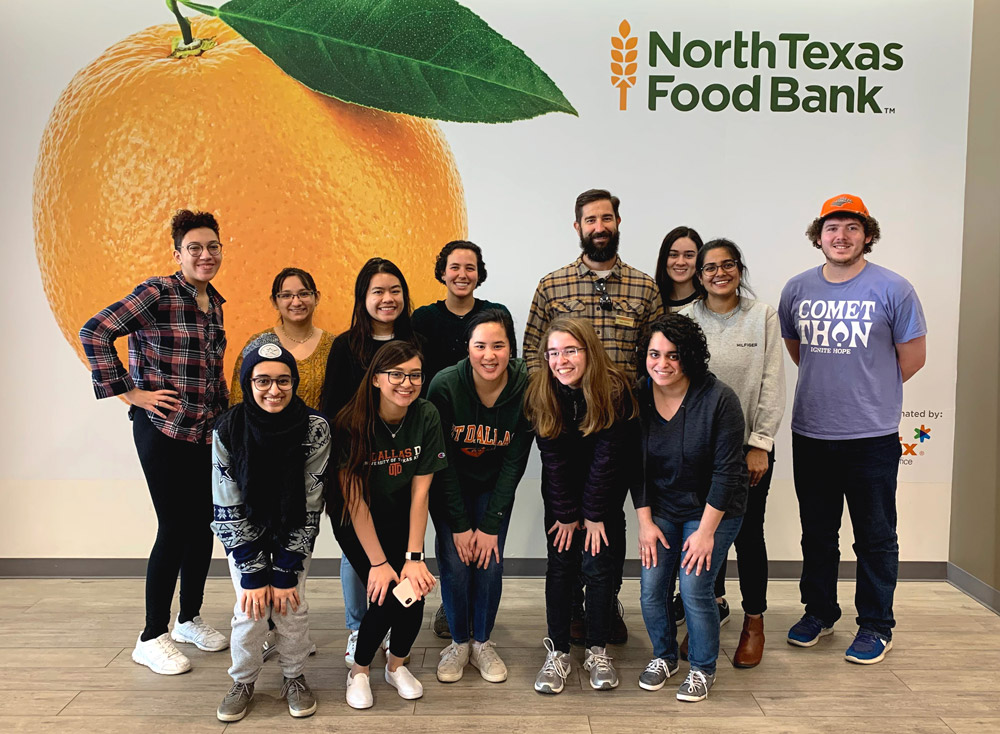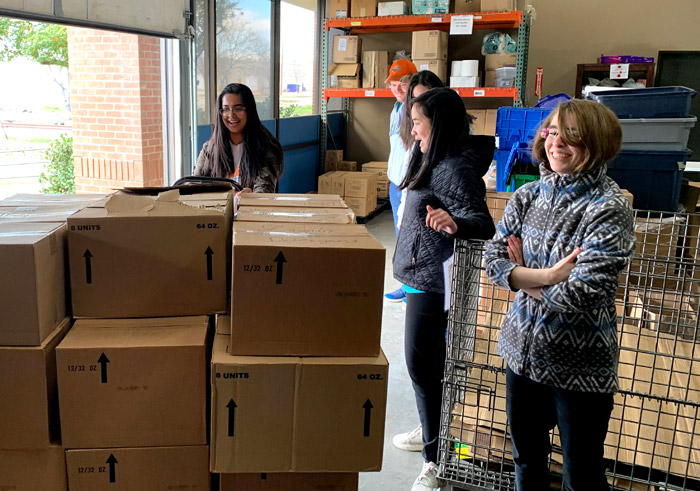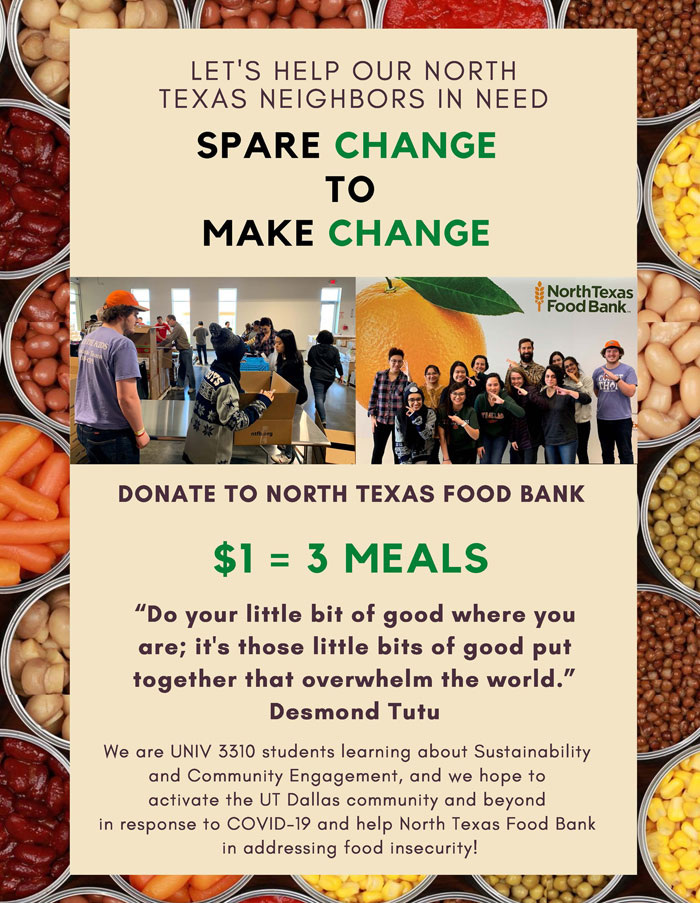Students Develop Recipe To Help North Texas Food Bank During COVID-19 Outbreak
By: Robin Russell | April 29, 2020

Students in a new sustainability service learning class at The University of Texas at Dallas have put their knowledge to work with a virtual fundraising and donation campaign called #WhooshAwayHunger to support the North Texas Food Bank during the COVID-19 outbreak.
Students in the UNIV 3310 class Sustainable Development Goals: Local Action to Address Poverty and Hunger had zeroed in on hunger and food insecurity after studying the 17 Sustainable Development Goals initiated by the United Nations.
“We learned that poverty and hunger had the highest impact on people’s physical and mental health. You cannot sustain without food. If your basic needs aren’t met, you can’t contribute to society,” said Harshini Rallapalli, a cognitive science senior in the School of Behavioral and Brain Sciences who took the course as one of her electives.
When the coronavirus hit, the class quickly shifted gears to help with a real-life local problem and began focusing their efforts on supporting the local food bank.
The North Texas Food Bank works closely with more than 200 food pantries, soup kitchens, shelters and other facilities in North Texas to get nutritious food to those who need it. With many businesses closed and more Texans becoming unemployed, the food bank has needed additional resources.
“Things like COVID-19 come along, and you can lose your motivation to study. But this is real life. This is something we can do,” Rallapalli said.
The sustainability class is part of the University’s growing community-based service learning program, which gives students the opportunity to explore new topics while serving as teachers and mentors in the community.
Students in these series of classes have helped immigrant high schoolers with English, talked to fifth- and sixth-grade girls about social media and bullying, and worked with homeless teens in Dallas.
The classes are supported through a three-year, $1 million grant The University of Texas System provided in 2017 for “Engagement through Collaboration, Mentorship and Service Learning.” The funds were part of a broader $10 million initiative that provided for campus-based programs in support of former Chancellor William H. McRaven’s Student Success Quantum Leap.
The weekly, small-group classes have helped the community and given students a greater sense of purpose, said Joanna Gentsch MS’96, PhD’06, director of student and community engagement in the Office of Undergraduate Education, who designed and expanded the program across campus.
“Although the other classes have been well-received and meaningful for all who have participated, I recognized that there was a need to have a class that would include students who are not able to travel to our community sites. Given our recent situation, this class has been particularly relevant,” said Gentsch, a senior lecturer in the School of Behavioral and Brain Sciences.
“Our class was focused on big-picture, systemic issues that are root causes of food insecurity, but when COVID-19 changed everything, we saw that we could also apply our knowledge to assist in relieving the food insecurity caused by the pandemic. I am so proud of the leadership and adaptability of our students, and I can’t wait to see the positive impact that they make.”
Gary Cocke, associate director of energy conservation and sustainability at UT Dallas
“Thanks to course instructor Gary Cocke’s leadership and our students’ energy and focus, UNIV 3310 has been able to pivot successfully to an online format while keeping students engaged. Integrating the United Nations Sustainable Development goals into the curriculum empowers students to not only learn about global issues but also creates an avenue for them to make meaningful contributions to social change,” Gentsch said.
The sustainability class of about a dozen students collaborated online to execute their plan, forming a timeline and then setting tasks to develop the campaign. They used the mobile group messaging app GroupMe to work together.
The campaign slogan “Spare Change for Change” encourages the UT Dallas and surrounding community to make donations of even small amounts. Participants also are asked to share the campaign on social media to raise awareness for hunger in North Texas.
“It’s an easy way for one person to help. It doesn’t cause you to overthink. Everyone has a dollar laying around. Why not pay it forward?” Rallapalli said.
Anna Kurian, senior director of marketing and communications for the North Texas Food Bank, said the organization was grateful for the students’ help because the COVID-19 pandemic is unlike anything the region has ever seen.

“The need in the community is unprecedented, and luckily there is a caring community working to make a difference,” Kurian said. “Our team was thrilled to learn that our neighbors at UT Dallas wanted to get involved. Their innovative campaign to bring in donations of food and funds couldn’t come at a better time. We are grateful for their unwavering support.”
Class instructor Gary Cocke, associate director of energy conservation and sustainability, said his goal for the class was to build on the students’ passion for sustainability and empower them to apply their knowledge to benefit communities.
“Our class was focused on big-picture, systemic issues that are root causes of food insecurity, but when COVID-19 changed everything, we saw that we could also apply our knowledge to assist in relieving the food insecurity caused by the pandemic,” Cocke said. “I am so proud of the leadership and adaptability of our students, and I can’t wait to see the positive impact
that they make.”
Rallapalli said the sustainability class has been different than any course she has taken because it opened her eyes to ways that individuals can help enrich the lives of those in their communities.
“If I hadn’t taken the class, I wouldn’t be so passionate about advocating for change,” Rallapalli said. “COVID-19 has reminded us that we need to work together, and there’s no better way than to come together for a good cause.”
North Texas Food Bank Helps Comet Cupboard
Since campus closed in mid-March, the Comet Cupboard has served almost 500 students due to the increased needs of hungry Comets as a result of the coronavirus pandemic.
This week the North Texas Food Bank delivered 10 pallets — about 150 pounds — of packed produce in 750 boxes to supplement the Comet Cupboard’s supply of shelf-stable items.
“During this pandemic, we’re covering areas of need that we haven’t traditionally seen,” said Erica Yaeger MBA’02, chief external affairs officer for the North Texas Food Bank. “College hunger is something we’ve seen an increase in, so we’re working with local entities to help.”
The drop-off was performed through the food bank’s mobile pantry, which travels across 13 counties to deliver nutritious meals to pantries, organizations and individuals facing shortages. The Comet Cupboard handled the distribution of items on campus.
“A thriving community is a nourished community, and a student can’t learn, thrive, grow or function if they’re facing food scarcity,” Yaeger said. “We’re dedicated to providing food to as many people as needed. With students especially, we know how important that nourishment is.”
— Melissa Graham
Media Contact:
Robin Russell, UT Dallas, 972-883-4431, robin.russell@utdallas.edu, or the Office of Media Relations, UT Dallas, (972) 883-2155, newscenter@utdallas.edu.






